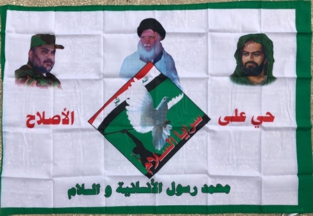 image by Randy Young, 7 October 2016
image by Randy Young, 7 October 2016
FOTW beschäftigt sich mit der Wissenschaft der Vexillologie (Flaggenkunde).
Alle auf dieser Website dargebotenen Abbildungen dienen ausschließlich der Informationsvermittlung im Sinne der Flaggenkunde.
Wir distanziert uns ausdrücklich von allen hierauf dargestellten Symbolen verfassungsfeindlicher Organisationen.
Last modified: 2020-08-01 by ian macdonald
Keywords: iraq | shiite | mehdi army | peace companies |
Links: FOTW homepage |
search |
disclaimer and copyright |
write us |
mirrors
 image by Randy Young, 7 October 2016
image by Randy Young, 7 October 2016
The Mehdi Army is now called Peace Companies (Saraya al-Salam). Its new flag
is the logo (https://en.wikipedia.org/wiki/Peace_Companies#/media/File:Logo_of_the_Peace_Companies.png)
on a white horizontal flag as seen here:
http://cdn.iraqinews.com/wp-content/uploads/2015/05/NB-135493-635684218915299753.jpg
(source:
http://www.iraqinews.com/iraq-war/al-salam-brigades-we-are-thirsty-american-blood/)
and
http://jihadintel.meforum.org/pics/symbols/large/295.jpg (source:
http://jihadintel.meforum.org/group/124/saraya-al-salam).
For
additional information go to Saraya al-Salam (official website):
http://sarayasalam.com/
Esteban
Rivera, 4 October 2016
 image from William Garrison, 30 October 2013
image from William Garrison, 30 October 2013
The green flag seems to have image of Iraq border, with a Lebanon flag. Maybe an ISIS variety?
William Garrison, 30 October 2013
The image was taken on July 21, 2006. It, and others from the same march, can
be found at Getty Images. The caption of the photo is:
"Baghdad, IRAQ: Armed members of radical Shiite cleric Moqtada al-Sadr's armed
movement, Mehdi Army, carrying assault rifles and rocket propelled grenades and
waving Lebanese and Hezbollah flags parade through the Baghdad Shiite district
of Sadr City 21 July 2006. More than 300 Mehdi Army militiamen paraded in
solidarity with Lebanon's Shiite militia of Hezbollah currently battling Israel
in southern Lebanon." Photo credit should read Wissam al-Okaili/AFP/Getty Images).
I presume the green flag represents al-Sadr's Mehdi Army. It, like Hezbollah, is
a Shia group. It would be in conflict, not alliance, with a Sunni group like
ISIS.
Andy Shelton, 03 November 2013
The Mehdi Army sometimes known as al-Dajjal Army and even known as
Jaysh al-Mahdi or Mahdi Army, is an armed movement that appeared in 2003. The
name refers to the Mahdi, a long-since disappeared Imam who is believed by Shi'a
Muslims to be due to reappear when the end of time approaches. The tradition
mentions that prophet Muhammad said that the advent of the Mahdi would be
signaled by "Black Standards" proceeding from Khorasan. Hence the use of
black flags
referring to
Jihadists movements. This group has periodically engaged in violent
conflict with the United States
and other Coalition forces, while the larger Sadrist movement has
formed its own religious courts, and organized social services, law
enforcement, and prisons in areas under its control. par of the
support and relation among this and other groups is that there are
some SGs (Special Groups) a designation given by the American military
to the cell-based Shi'a paramilitary organizations operating within
Iraq, backed by Iran. According to the Americans these groups are
funded, trained, and armed by the Iranian Quds Force, part of the
Islamic Revolutionary Guard Corps. A distinction between
these groups and the Mahdi Army has been maintained more clearly since
al-Sadr called for a
ceasefire at the end of August 2007 following Mahdi Army clashes with
Iraqi Security Forces in Karbala, Iraq but the Special Groups
continued fighting. After the disbanding of the Mahdi Army in 2008 its
successor was announced as a group called the Brigade of Promised Day;
however the largest special group which emerged after the Iraq spring
fighting of 2008 was a group called the Asa'ib Ahl al-Haq or Qazali
Network. According to the Guardian newspaper in March 2014, Asa'ib Ahl
al-Haq is controlled by Iran under Al-Quds Force. Another large
special group is Kata'ib Hezbollah (or Hezbollah Brigades) which
started to operate independently from the Mahdi Army and the other
Special Groups."
Sources:
http://en.wikipedia.org/wiki/Mahdi_Army,
http://en.wikipedia.org/wiki/Muqtada_al-Sadr,
http://en.wikipedia.org/wiki/Quds_Force,
http://en.wikipedia.org/wiki/Abu_Bakr_al-Baghdadi and
http://en.wikipedia.org/wiki/Special_Groups_(Iraq)
Esteban Rivera, 17 June 2014
Several flag images of this group can be found on a
Google-image search.
Bill Garrison, 20 August 2019
 image from William Garrison, 19 November 2019
image from William Garrison, 19 November 2019
Source:
https://www.middleeastmilitaria.com/pmu-militant-group-flags.html
"The
Peace Companies [Saraya al-Salam] are the modern revival of the Mahdi Army, and
are led by Muqtada al-Sadr. They are currently part of the PMU and have been
battling ISIS." (c. 2019)
Peace Corps/Brigade flag with photos of 3
Shia-Muslim religious figures; (Left to Right): Muqtada al-Sadr [b. 1974] a
Shiite religious-political leader in Iraq {here seen in military garb}; his
father Muhammad Sadeq (or Sadiq) al-Sadr (or as-Sadr) [b.1943-d.1999] a Shiite
Grand Ayatollah in Iraq; and Shiite Imam al-Husayn (or Hussain) [d. Oct. 680 at
the battle of Karbala].
Here "Peace Corps" is not similar to the
non-military U.S. Peace Corps, but in Iraq it refers to a resistance military
unit the size of either a Corps or a Brigade (depending on how you want to
translate the size of the military unit). [Depending upon your transliteration,
"Peace Corps/Brigade/Company" can be spoken as: "Saraya al-Salam"; "saraya" for
either "corps" or "brigade" or "company", and "salam" for "peace".] The red
slogan in the tilted square logo reads: "Saraya al-Salam".
William Garrison,
19 November 2019
Hosted by: Fanshop-Online.de und Handy-Shop.de
Tipp: Apple iPhone 12 im Shop